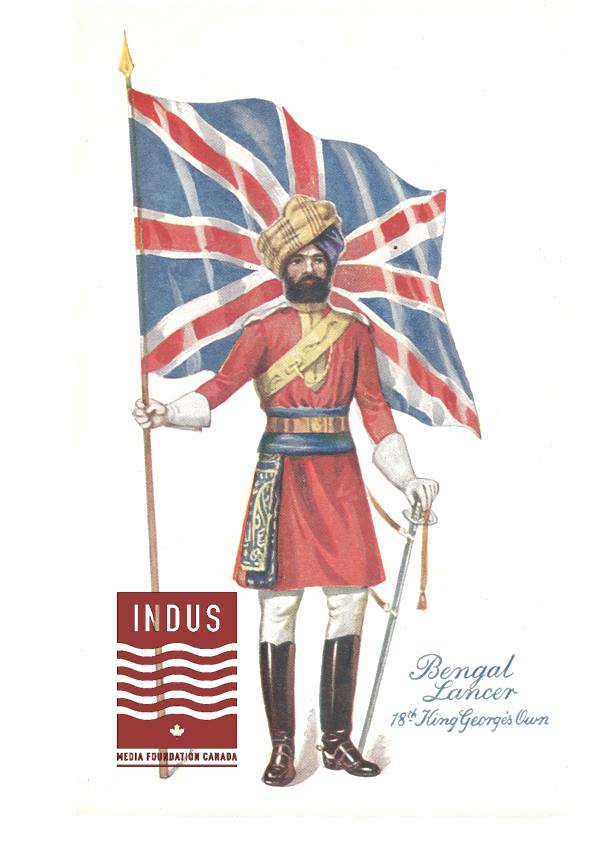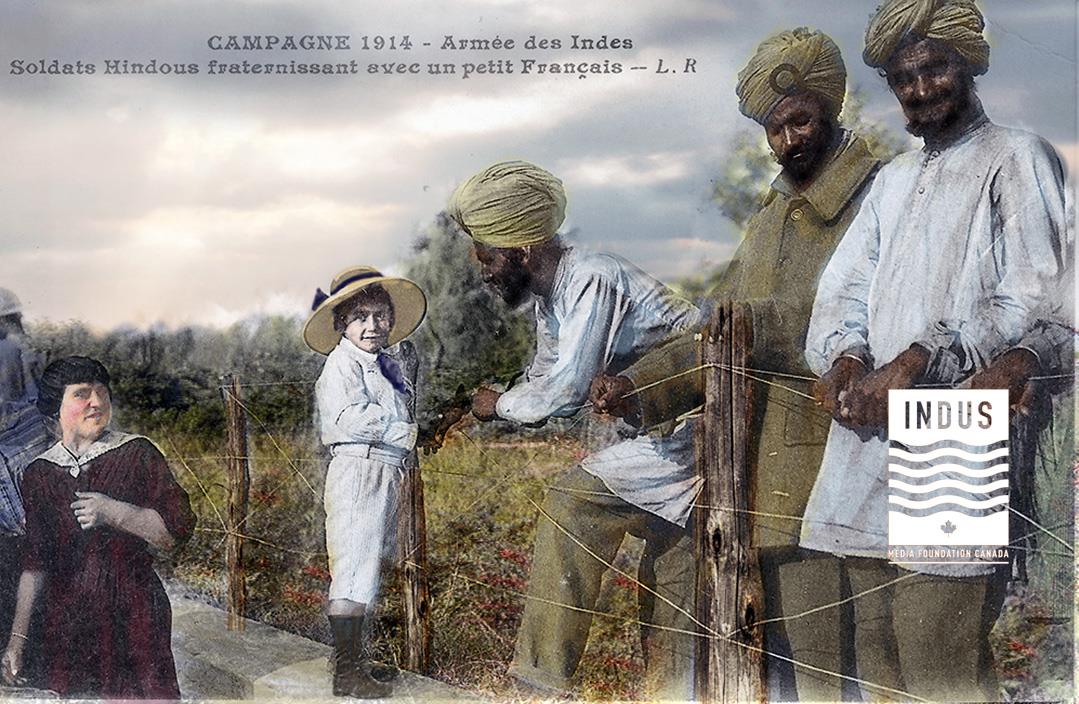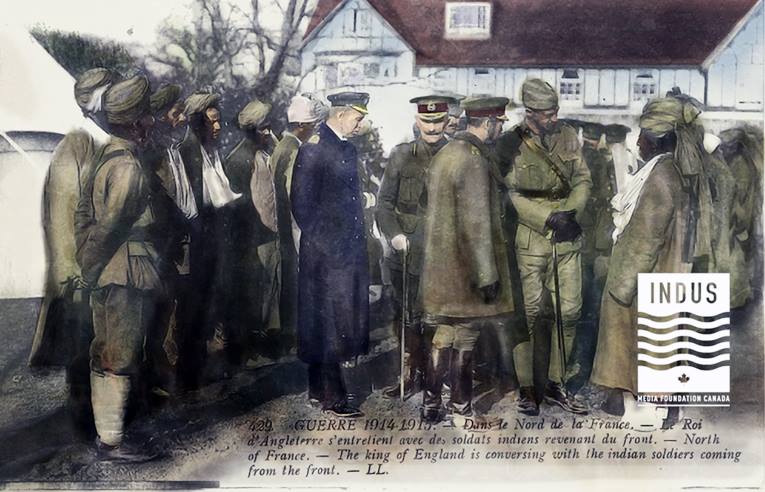
100 Year Old WW1 Letters Expose Punjabi Attitudes Towards Europeans
During the winter of 1914-15, the war, expected by many to be over by Christmas, took a breath as both sides dug in along the Western Front. Rank and file remained cheerfully oblivious to the long bloody onslaught that awaited them. Instead, during these early days, the thoughts of men from the #Punjab remained filled with hubris and wonderment – all to be captured in the censor reports on their letters home. While the letters may be long lost, the censor’s reports remain, providing us with a perspective of war that is once both intimate and global; until now the “First World War”, despite its name, was the sole preserve of European perspective.
Amongst the letters of January 1915, startling insights into the attitudes of the #Sikhs in fighting for King and Crown, can be found.
A relative in Gobind Garh Punjab corresponding with a Jemadar of the 34th Sikh Pioneers in France, writes:
“I was distressed to hear that you had been wounded. But God will have pity. Keep your thoughts fixed on the Almighty and show your loyalty to the Government and to King George V. It is every man’s duty to fulfill his obligations towards God, by rendering the dues of loyalty to his King. If in rendering the dues of loyalty he must yield his life, let him be ready to make even that sacrifice. It is acceptable in the sight of God, that a man pay the due of loyalty to his King. God grant you life and happiness. Those heroes who have added lustre to the service of their country and King, let them offer this prayer before God, that victory may be the portion of their King, and let them show the whole world how brave the people of India can be. The final prayer of this humble one before God Almighty is this — that God may make bright the heroes of Hindustan in the eyes of the world and with his healing hand may soften the sufferings of the wounded and restore them to health, so that they may go back to the field of battle and render the dues of loyalty to their King of peace, the King of kings, George V, and secure the victory for him.”
A wounded Sikh in hospital in England writes to family back in Punjab (18th January 1915) :
“I am well and pray ever for your welfare. My dear brother, this is a very fine country. They have an excellent way of doing things, and there is such beauty in the country. There is no doubt about it. Very many people come to see us, and one cannot tell the lord from the beggar. All are alike and they do everything with great intelligence and skill. They use dogs to drive their animals (that is cattle) and to extract butter from milk. They grind wheat and do everything by machinery, and thresh the straw – all by machinery. And they plough with horses. As for the shopkeepers, they are very honest and make no difference in their prices. Whether it be a child or a grown man, they ask the same price of everyone. There is no theft or dishonesty. The shops remain open all day long and never a penny is stolen… And the buildings (that is the houses) are very, very fine indeed. Each house has at least seven storeys and the workmanship that they put into them is beyond description. You many look at it all day and still not satisfy the desire of your heart to see. And they are very rich and full of intelligence. Even the children speak well. And they deal with one another in very brotherly fashion. And there is no doubt of their cleanliness: they are very clean. And they eat with wonderful skill and daintiness. The boys and girls go to school from their earliest years to be educated, and there are many Indians here who are here for their education.
My dear brother, I must finish my letter. For here I am as a king, but the war is still going on. Hundreds and thousands are engaged and it goes on day after day … There can be no confidence of life or of seeing again the dear children or of seeing you once more. For in a few days I shall go back to the war. When shall come the day when I shall see again my dear children? When shall I see you? Well’ my brother, do not be anxious. We shall see what will come of it. My love to the dear children and greetings to all my friends. If I live I will write again.”
Another #Sikh in the same hospital writes to his brother in Amritsar District, Punjab (20th January 1915) :
“I pray to the Guru that I may return to my home. I do not know for certain, but I expect so. For I was hit on my trigger finger and the third part Of it is cut off so I hope that I shall return neither to the battle nor to the trench, I have twice escaped the bullet and am ready to do loyal service again I am certain that I shall not die until I am in my country. Since none of us fear death. The Guru has hardened our hearts to stone Not one of us who went into battle took any thought of his brothers every one of us repeated the name of the Guru. It is good for a man to die in battle in this way. He goes to Heaven. So all of us at that time kept in our hearts a prayer to the Guru. For those die thus. Heaven is fulfilled. Those who die in their villages. They die among their children and brothers for them Heaven is incomplete. At this time none of us cherish any earthly lose. We shall all home and then we shall enjoy such love.
These fascinating glimpses into the lives of Indian soldiers fighting in a foreign land – for a cause many would debate today – are housed in a large repository of letters in the archives of the British Library. Please visit our website www.IMFC.org for more letter compilations as we track the fortunes of the soldiers of the King and Canada’s debut onto the battlefields of Europe.
#RememberThem
Illustrations:
- #WW1 ‘Loyalty ‘ Post Card (IMFC.org collection)
- Sikh troops behind the lines in France Post Card 1914-15 (IMFC.org collection)
- King George V visits Indian Soldier on the Front in France (IMFC.org collection)



